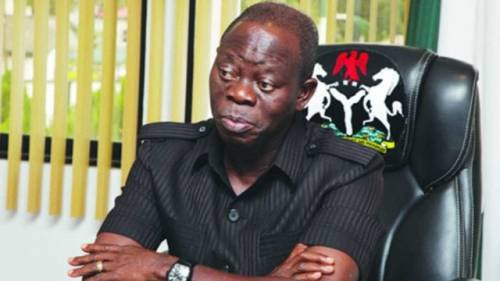The Economic and Financial Crimes Commission, EFCC, has provided reasons it cannot arrest and prosecute former Governor of Edo State, Adams Oshiomhole now.
The anti-graft agency is challenging the jurisdiction of the Federal High Court in Abuja to compel it to arrest and prosecute Oshiomhole, over allegation that he diverted public funds to his personal use while in office as governor.
EFCC admitted that it has received petitions accusing the All Progressives Congress, APC, National Chairman of complicity in acts of corruption, but added that it was not under any obligation to report or give account of its investigations to any individual or under a timeline within which to carry out its functions.
The anti-graft agency, therefore, urged the high court to dismiss the suit that is seeking to invoke an order of mandamus to compel it to initiate criminal proceedings against the embattled APC Chairman.
The suit marked FHC/ABJ/CS/628/2018, was filed before the court by Edo State based cleric and activist, Bishop Osadolor Ochei.
The cleric wants the court to declare that EFCC has a statutory duty to investigate different petitions that contained allegations of financial recklessness against Oshiomhole.
The pastor told the court that Oshiomhole who was sued as the 2nd Respondent, while in office as Edo state governor, acquired properties in United States of America, South Africa and Dubai worth billions of U.S. dollars and far in excess of his legitimate income.
He alleged before the court that Oshiomhole built a sprawling mansion worth more than N10billion in his home town known as Iyamho, while in office.
The pastor told the court that “The said building was constructed by Verissimo, a South African Architectural outfit. The said house of the 2nd Respondent has swimming pools, water fountains, multiple theatres for cinema and live performances, huge event halls, bridges, manmade lake, lodges of different sizes amongst others.
“The said cost of building the mansion is well outside the 2nd Respondent’s legitimate income. The 2nd Respondent’s lifestyle and extent of the said property were not justified by his source of income.”
The pastor told the court that he sent a petition to the EFCC on November 4, 2016, where he detailed some corrupt practices he said the ex-governor was involved in.
He maintained that EFCC’s refusal to act on petitions containing “weighty allegations” against Oshiomhole, ran contrary to Section 15(5) of the 1999 Constitution (as amended) which enjoined the State to abolish corrupt practices.
But the EFCC, in a preliminary objection that was signed by its team of lawyers led by the Head of its Legal and Prosecutions Department, Mr. G.K. Latona, challenged the locus- standi of the Applicant to file the action.
▪Sahara Reporters
